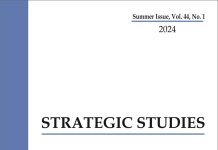Abstract
The rapid expansion of nuclear weapons and related technology has posed serious threats to global peace. Ensuring the safety of nuclear assets has become a serious challenge for the global community. The increasing influence of non-state actors and terrorist groups worldwide has undermined the traditional security arrangements. Such is the case of Pakistan and India, two hostile neighbours with a history of conflicts and wars whose status as nuclear-weapons states (NWS) is the source of strategic stability in South Asia. This study focuses on the specific situation in Pakistan and India, examining their relationship, the terrorist threats they face, and their vulnerabilities to nuclear terrorism. According to many security analysts, it has been assumed that the Kargil War in 1999, the 2001-2002 military stand-off and the Mumbai attacks in 2008, have weakened the chances of strategic stability in South Asia. Both states face serious threats from terrorist groups which have been successful in creating mistrust between them. The increasing influence of terrorist organizations in the South Asian region can lead to a serious situation; in the case of Pakistan and India, it could provoke conflicts which could escalate into nuclear war. Mutual trust and regional cooperation could be in the interests of both states as well as for the region.













